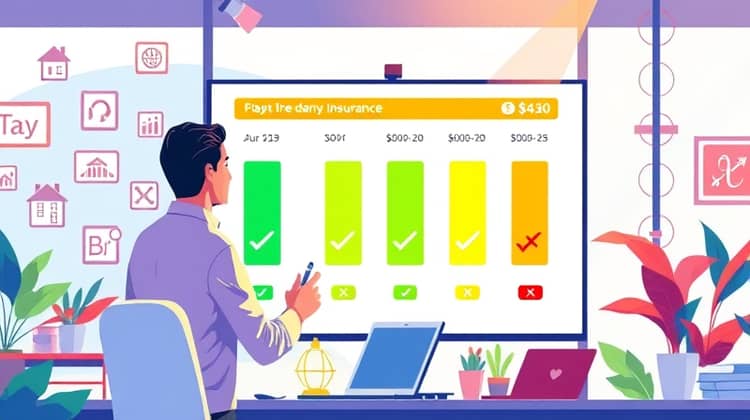Unveiling the Connection: How Your Credit Score Directly Impacts Insurance Costs

In a world where financial health is paramount, understanding how various factors affect it is crucial. Among these factors, credit scores hold a significant place, influencing not only loan approvals and interest rates but also insurance costs. Despite being seen primarily as a measurement of creditworthiness, credit scores' implications extend beyond lending into the realms of insurance. This article will delve into how your credit score is intertwined with your insurance premiums, providing insights and actionable steps for managing this connection.
As we decode the intricacies of credit scores, it's essential to grasp their basic components and the weight they carry in financial transactions. A higher credit score can signify a responsible approach to borrowing, while a lower score often points to potential risks for lenders and insurers alike. Knowing how these scores are calculated can empower individuals to make informed financial decisions.
By understanding the mechanics of credit scores and their consequential impact on various aspects of life, individuals can take steps toward better financial health. Let's explore the connection between credit scores and insurance, revealing the significance this relationship holds in today's economic landscape.
Understanding Credit Scores

Credit scores are numerical representations of an individual's creditworthiness, derived from their credit history and behavior. These scores are primarily used by lenders to assess the risk of lending money or extending credit. A robust credit history typically translates to a higher credit score, while missed payments or over-reliance on credit can lead to a decrease in score.
Typically, credit scores range from 300 to 850, with higher scores indicating lower credit risk. Various factors contribute to the calculation of these scores, including payment history, credit utilization, length of credit history, types of credit in use, and recent credit inquiries.
- Payment history accounts for 35% of your credit score.
- Credit utilization makes up 30% of your score.
- Length of credit history contributes 15%.
- Types of credit utilized account for 10%.
- Recent inquiries affect 10% of your score.
Understanding the components of credit scores is vital not only for securing loans but also for navigating the insurance landscape. Insurers use these scores as part of their assessment when determining premiums, making it essential to maintain a healthy credit score.
The Role of Credit Scores in Insurance

Insurance companies rely on various metrics to calculate risk and determine premiums, and credit scores are one of those key metrics. While it might seem unfair to factor in credit scores when assessing insurance risk, research has shown that individuals with higher credit scores tend to file fewer claims than those with lower scores.
The reasoning behind this practice is rooted in statistical analysis; insurers have found a correlation between credit scores and claims behavior. Those with lower credit scores may present a higher risk of not only more frequent claims but potentially larger ones as well. Therefore, many insurers have adopted the practice of using credit scores as part of their risk assessment models.
Why Insurers Care About Credit Scores

Understanding why insurers view credit scores as a significant factor can illuminate their risk assessment methodologies. A credit score serves as a predictive tool, with research supporting that individuals with lower credit scores are more likely to engage in risky behaviors, including filing claims. This drives insurers to adjust their premiums accordingly, as they attempt to mitigate potential losses.
Additionally, credit scores can reflect an individual's stability and reliability. Insurers often interpret higher scores as indicative of responsible financial behavior, which may correlate with overall responsible behavior across all aspects of life, including safe driving or prudent home maintenance. This reinforces their reliance on these scores during the underwriting process.
- Higher credit scores correlate with fewer claims.
- Lower credit scores may indicate a higher likelihood of filing larger claims.
- Insurers use credit scores to maintain premium profitability.
- Credit scores reflect overall financial responsibility.
- Insurers adopt credit scores for comprehensive risk assessments.
As a result of this correlation, many consumers may see their insurance rates fluctuate significantly based on their credit scores. This dependency on credit scores is a crucial reality that consumers need to understand to navigate their insurance costs effectively.
Types of Insurance Affected

Not all insurance types utilize credit scores, but those that do include several main categories that can profoundly affect consumers. Understanding these categories is essential for individuals aiming to anticipate potential costs based on their credit scores.
The insurance types most commonly influenced by credit scores include auto insurance, home insurance, and renters insurance. Each of these categories incorporates credit assessments in varying degrees, affecting how premiums are structured.
- Auto Insurance
- Homeowners Insurance
- Renters Insurance
- Life Insurance in some cases
- Commercial Insurance for businesses.
Knowing which types of insurance employ credit scores can guide consumers in making informed decisions about maintaining their financial health, which, in turn, affects their insurance expenses.
How Credit Scores Affect Insurance Costs

Credit scores can influence insurance costs more significantly than many consumers realize. A difference in credit score of just a few points can lead to variations in premium costs, sometimes ranging in the hundreds of dollars per year.
In general, individuals with excellent credit scores can find premiums that are considerably lower compared to those with fair or poor scores. This financial disparity further emphasizes the long-term benefits of maintaining a healthy credit score.
Improving Your Credit Score for Better Insurance Rates

Improving your credit score is not just advantageous for securing better loan terms but can also lead to reduced insurance premiums. Thus, cultivating a strong credit profile should be a priority for anyone looking to enhance their overall financial health.
- Pay bills on time to build a positive payment history.
- Reduce debts to lower your credit utilization ratio.
- Regularly check credit reports for errors and dispute inaccuracies.
- Avoid opening multiple new accounts hastily to ensure stable inquiries.
- Maintain older accounts to lengthen your credit history.
Taking these steps may help you enhance your credit score, leading to better insurance premiums and overall financial security.
The Debate: Is it Fair?

The fairness of using credit scores in insurance underwriting is a contentious topic. Many argue that incorporating credit scores into premium calculations penalizes individuals who may have faced unforeseen financial hardships but are otherwise responsible. This argument highlights the disparities in how different socioeconomic groups may be affected by this practice.
Conversely, proponents assert that the relationship between credit scores and claims propensity is grounded in data and risk assessment. They argue that allowing insurers to utilize credit scores creates a more accurate picture of an individual's risk profile.
The ongoing debate touches on fundamental questions regarding equity in financial services, with growing calls for regulators to examine the appropriateness of credit scores in assessing insurance applicants.
Conclusion

In conclusion, the link between credit scores and insurance costs is apparent, showcasing the need for individuals to be aware of their credit standings. Understanding how one’s credit score can affect their insurance premiums is vital for not only budgeting but also financial planning. Armed with insights about credit scores, consumers are better positioned to take proactive steps towards enhancing their financial health and potentially reducing their insurance costs.
It is essential for consumers to recognize that maintaining a good credit score is an ongoing process that requires diligence and awareness of one’s financial behaviors. By improving credit scores, individuals may not only benefit from lower insurance costs but also foster better financial stability in many areas of their lives.
With the right strategies and commitment, anyone can improve their credit score and subsequently enhance their conditions in both lending and insurance markets.






